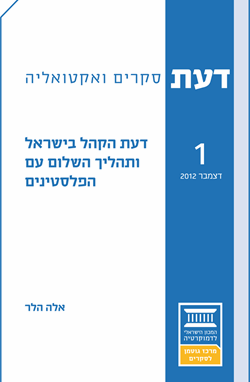Israeli Public Opinion on the Peace Process with the Palestinians
- Written By: Ella Heller
- Supervisor: Prof. Tamar Hermann
- Publication Date:
- Cover Type: Online Booklet
- Number Of Pages: 21 Pages
- Center: Viterbi Family Center for Public Opinion and Policy Research
A report on trends in the attitudes of Israel’s Jewish population towards peace with the Palestinians, which was prepared for the 2012 Sderot Conference on Social Issues.
The first issue of Daat was prepared for a session at the Sderot Conference on Social Issues that took place on December 18, 2012. The report presents trends in the attitudes of Israel’s Jewish population towards peace with the Palestinians, focusing on:
- The centrality of the issue to the Jewish population of Israel
- The extent to which Israel’s Jewish population believes that there is a solution to the conflict
- The extent of support for possible solutions and the Jewish population of Israel.
The study is based primarily on surveys conducted within the framework of the Peace Index, a joint project of the Israel Democracy Institute and the Evens Program for Mediation and Conflict Resolution at Tel Aviv University, as well as on the findings of other surveys included in the database of IDI’s Guttman Center for Surveys.
A summary of the main findings of this study can be found below.
- In most years studied, peace was ranked third in the priorities of Jewish Israelis. Only in 1969, 1992, and 2009 was peace ranked as the top priority.
- Combining the respondents who chose security as the most important issue with those who chose peace as the most important issue indicates that ever since March 2011, there has been a sharp decrease in the importance ascribed to the political-security agenda by Jewish Israelis.
- The social protest of the summer of 2011 had almost no impact on the percentage of respondents who believe that achieving peace with the Palestinians is the most important issue. The intensification of demands to decrease socio-economic gaps and to integrate ultra-Orthodox Jews in the labor market was mainly at the expense of the demand to attribute greater importance to strengthening Israel’s military power.
- Within responses to questions related to promoting peace: those who view peace as the most important goal tend to see the peace process more positively and to be more optimistic regarding its prospects of success than those who did not choose peace as the most important goal.
- The characteristic that is most frequently related to choosing peace as the most important objective is identification with the leftist camp. Secularism, academic education, and high income also characterize those who attribute great importance to promoting peace. Similarly, a greater percentage of people aged 35 and over, compared to younger people, see peace as a most important objective.
- In all the years, the majority of the Jewish public supported negotiations with the Palestinians. In 1994–2000, support for the Oslo Accords stood at approximately the middle of the maximum value on its assessment scale, while in 2001–2008 it stood at approximately the lower third of this scale. In the years in which parallel assessments were conducted, there was always low support for the Oslo Accords compared to support for the negotiations with the Palestinians.
- Belief in the success of the Oslo Accords is also always lower than the belief that negotiations with Palestinians will bear fruit.
- In every measurement, support for negotiations with the Palestinians or for the Oslo Accords is noticeably higher than the belief that either of these processes will be successful in bringing peace.
- Between December 2002 and September 2009, the majority of the Jewish Israeli public supported, in principle, a solution of two states for two nations, although this support decreased in surveys in which the question mentioned that the solution would involve certain concessions or that action must be taken to bring about the solution.
- When respondents are asked to choose between a solution of two states for two nations or a bi-national state, it is evident that there is a clear preference for the former solution.
- In most of the surveys conducted since June 2000, the majority of the Jewish Israeli public does not believe that a two-state solution will end the conflict.
- Among those Jewish Israelis who believe that negotiations with Palestinians will lead to peace in the near future, there are—as expected—several additional positive stances related to peace: a greater percentage of these respondents choose peace with the Palestinians as the most important goal than of respondents who do not believe that negotiations will lead to peace soon; more of them believe in the possibility that implementing a two-state solution will bring about an end to the conflict within the next 10 years; greater percentages of them believe that there is an urgent need to renew the peace talks; and they are more

